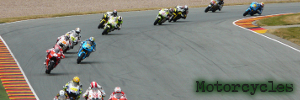















Paul Smart |
|---|

|
| Topic Navigation |
|---|
|
Wikipedia: Paul Smart (motorcyclist)
Page Sections Biography Article Index |
Biography
The following section is an excerpt from Wikipedia's Paul Smart (motorcyclist) page on 15 August 2020, text available via the Creative Commons Attribution-ShareAlike 3.0 Unported License.
Paul Smart is an English successful former short circuit motorcycle road racer who later entered Grands Prix.
Smart started racing in the latter half of the 1960s after attending the Charles Mortimer Race School at Brands Hatch race circuit, Kent in 1965, initially buying a Bultaco which proved expensive and unreliable, and later riding a variety of machinery in different classes on UK short-circuits.
For 1966 Smart shared a 125 cc Honda with John Button whilst saving money to buy a 250 cc Cotton which he rode successfully at club level, eventually winning the MCN 250 cc Championship. After the Cotton engine failed, he was provided with a Greeves by Chas Mortimer.
He won the 250 cc class at the Stars of Tomorrow meeting at Mallory Park, England on 3 July 1966 riding a Greeves.
He first entered the Isle of Man Manx Grand Prix in September 1966 riding a Greeves Silverstone as used by the race school.
During 1967, Smart was sponsored by Charles Mortimer Senior, proprietor of the Charles Mortimer Race School based at Brands Hatch race circuit, Kent, riding from a stable consisting of RDS Greeves 250s, a Bultaco 125 and an Aermacchi 350 together with Chas Mortimer, Charles' son. Both were also employed as road race instructors at the race school.
At the Isle of Man TT Races on a Norton for Paul Dunstall, Smart scored second place in 1967 and again second on a Norton in 1969, both in the Production 750 cc class.
Smart moved on to regular successes during 1969 when he was sponsored by Joe Francis Motors, a London motorcycle dealer selling AMC, which provided a 750 cc Norton, a Seeley, a 250 cc Yamaha, and winning the Hutchinson 100 Production machine event on a Triumph 750 cc. For 1970 there was a works Triumph Trident 750 cc and his own 350 cc Yamaha.
In the early 1970s Smart was riding in North America for the Hansen Kawasaki team on air-cooled H2R two-stroke triples.
Smart is famous for winning the Imola 200 on 23 April 1972, at age 29, riding Ducati's new 750 racer, based on the GT750 roadster. Ducati paid his airfare and £500 wages. A 750SS road bike and production race version followed, turning into the 1976 900SS which continued until the early 1980s.
Smart also raced in Grands Prix in the early 1970s, with second-place results in 1971 in both the 350cc and 250cc categories, riding Yamaha machinery.
After making history for Ducati and winning further races, in 1978 Paul finally hung up his leathers and retired from competition to concentrate on his motorcycle business which he expanded into three separate shops at one stage. He sold the shops and the family caravan park business in Kent, later qualifying as an offshore sailing skipper, formalising his long-time hobby.
In 2006, Ducati produced a 1000cc limited-edition PaulSmart 1000 LE, in recognition of the 1972 Imola win, designating it Paul Smart 1000LE. It had the advanced-technology of the time, but resembled the 1972 race bike.
Paul married Barry Sheene’s sister Maggie in 1971. Son Scott is a former Grand Prix racer who has won races in the British Superbike Championship and then turned to Superstock.
| Date | Article | Author/Source |
|---|---|---|
| 15 March 2016 | How Ducati was Put on the Map: British Customs Honors Paul Smart and the Imola 200 in Their Legends Series | British Customs |
